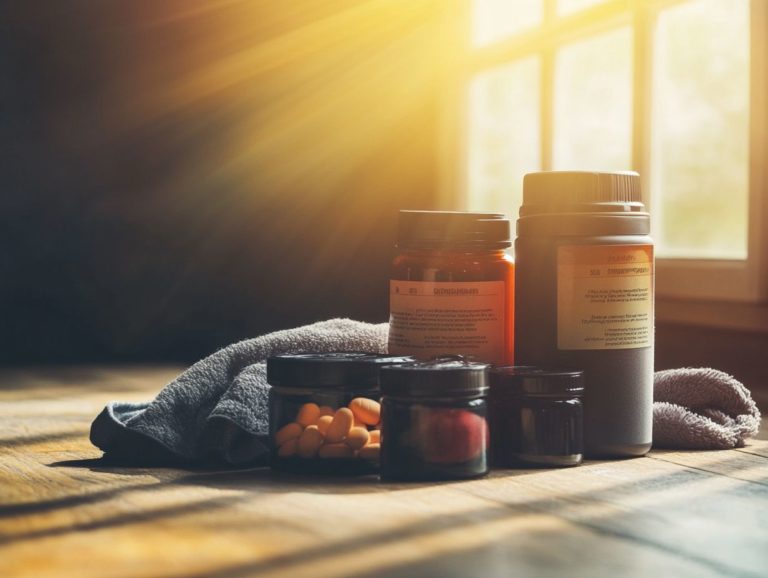How to Store Your Dietary Supplements Properly
Storing dietary supplements may appear simple, yet improper handling can profoundly affect their effectiveness and safety.
This article highlights why proper storage matters. Explore best practices to preserve the quality of your supplements, avoid frequent pitfalls that can lead to spoilage, and recognize when it’s necessary to replace your products.
Stay informed to ensure your supplements work for you!
Contents
- Key Takeaways:
- Why Proper Storage is Important for Dietary Supplements
- Factors to Consider When Storing Dietary Supplements
- Best Practices for Storing Dietary Supplements
- Common Mistakes to Avoid
- When to Replace Your Supplements
- Frequently Asked Questions
- How should I store my dietary supplements?
- Can I store my supplements in the refrigerator?
- Should I keep my supplements in their original packaging?
- Can I store my supplements in the bathroom cabinet?
- Do I need to keep my supplements out of reach of children?
- What is the best way to store liquid supplements?
Key Takeaways:
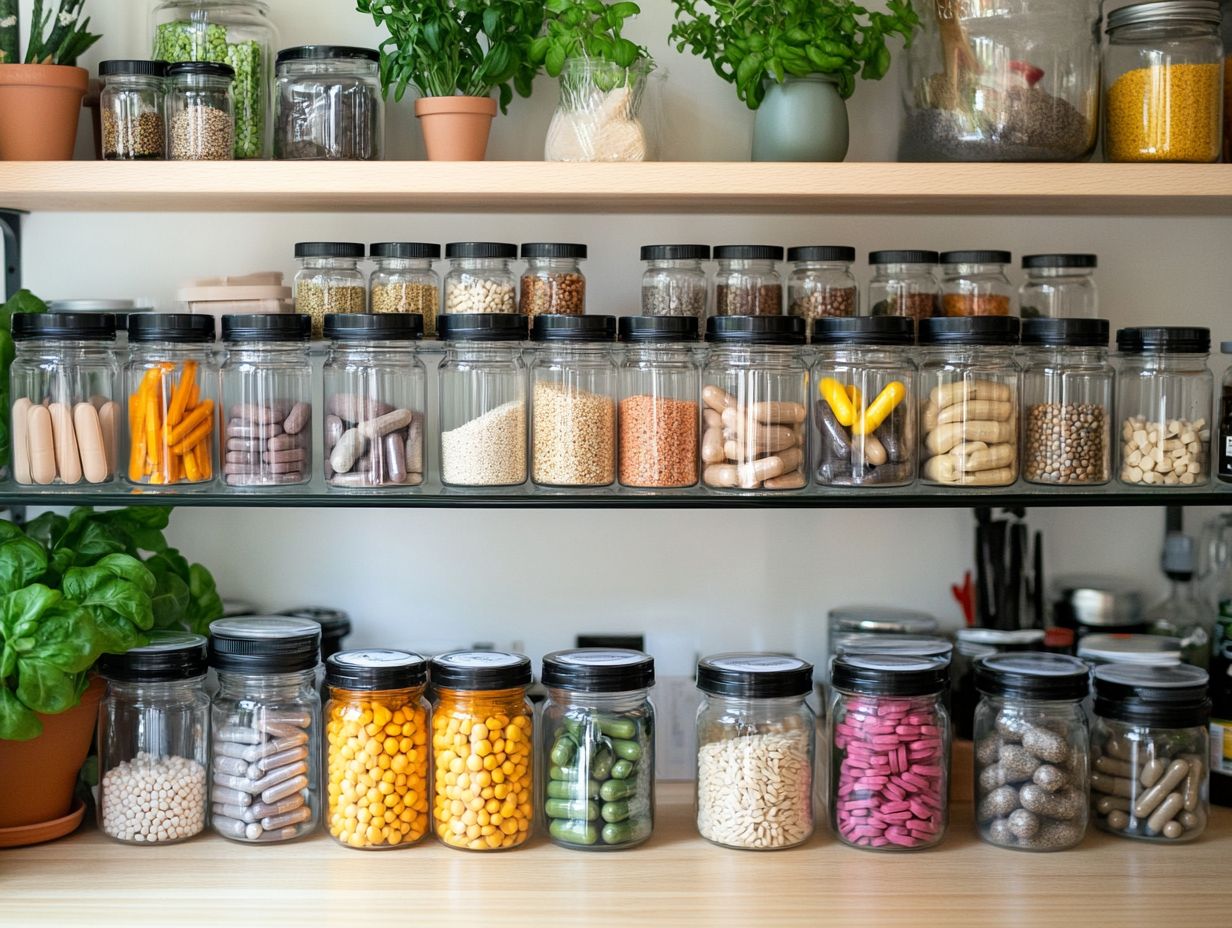
- Proper storage is crucial for maintaining the effectiveness of dietary supplements.
- Consider factors like temperature, humidity, and light exposure when storing supplements.
- Act now to keep your supplements effective! Follow best practices and avoid common mistakes to preserve the quality of your supplements and know when to replace them.
Why Proper Storage is Important for Dietary Supplements
Proper storage of dietary supplements is essential for preserving their effectiveness and ensuring consumer safety. Many individuals depend on vitamins and minerals to bolster their overall health and tackle specific health issues.
While the FDA sets quality standards, you must store your supplements properly. Improper storage can lead to the degradation of the beneficial parts of the supplements, undermining their benefits.
By mastering the art of proper supplement storage, you can significantly enhance their nutritional value and reduce safety risks, making it a critical component of your health care approach.
Impact of Improper Storage on Supplement Effectiveness
Improper storage of dietary supplements can negatively affect their effectiveness, potentially leading to nutrient deficiencies and diminished health benefits.
Elements such as heat, humidity, and direct light can seriously compromise the stability of vitamins and minerals. For example, high temperatures can dismantle sensitive compounds, while moisture might encourage the growth of mold or lead to the breakdown of the beneficial parts of the supplements.
If you’re not diligent about checking expiration dates or choosing the right storage containers, you could unwittingly consume supplements that have lost their potency. To get the most from your supplements, store them in cool, dry places ideally in opaque containers that protect them from light.
Factors to Consider When Storing Dietary Supplements
When storing your dietary supplements, it’s essential to consider factors like temperature, humidity, and light exposure, all of which play a crucial role in maintaining their quality and potency.
The ideal storage conditions can differ based on the type of supplement. For example, fat-soluble vitamins (which are absorbed with fat) like vitamin D require different care compared to water-soluble vitamins (which dissolve in water) like vitamin B12.
Understanding these nuances is vital for anyone aiming to make the most of their supplement choices and adhere effectively to dietary guidelines.
Temperature, Humidity, and Light Exposure
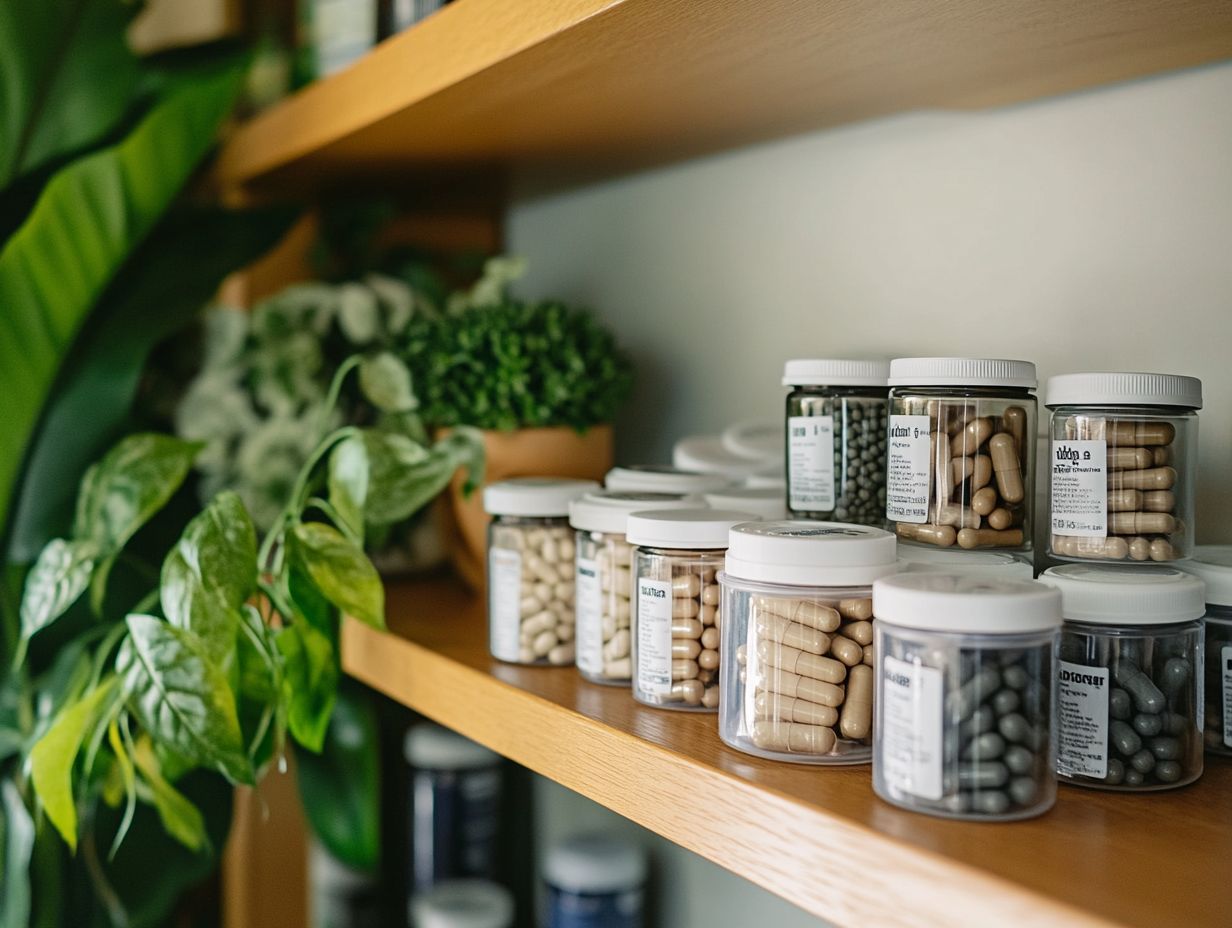
Temperature, humidity, and light exposure are essential factors that can profoundly affect the stability and longevity of dietary supplements.
Excessive heat can degrade active ingredients, gradually diminishing their effectiveness. High humidity can lead to moisture accumulation, risking spoilage and the unwelcome growth of mold or bacteria.
Furthermore, exposure to light can significantly reduce the potency of vitamins, making them less beneficial for those who depend on these supplements for their nutritional needs.
Don t wait! Store your supplements properly to keep them effective and safe! Utilize airtight containers to maintain a stable environment, prolonging the integrity of the nutrients within.
Best Practices for Storing Dietary Supplements
Implementing best practices for storing dietary supplements is important for maintaining their quality and ensuring they remain safe for consumption over time. By storing them correctly, you preserve the effectiveness of the vitamins and minerals and minimize safety risks linked to expired or damaged products.
Tips for Maintaining Supplement Quality
To maintain the quality of your dietary supplements, it s essential to follow specific tips that ensure they remain effective and safe.
Regularly checking expiration dates is important, as outdated supplements can lose potency or even pose health risks. Proper storage is vital; keeping them in cool, dark places shields them from heat and light that can harm their integrity.
It s equally important to protect them from moisture, as humidity can lead to clumping or spoilage. By considering these practices, you re not just consuming supplements; you re making a valuable investment in your overall health.
Ensuring proper storage significantly contributes to the long-term effectiveness of your dietary choices, ultimately supporting better wellness outcomes over time.
Common Mistakes to Avoid
By avoiding common mistakes in storing dietary supplements, you can significantly reduce the risk of spoilage and contamination, ensuring that you meet your dietary needs effectively.
Many individuals inadvertently compromise the effectiveness of their vitamins and mineral supplements due to a lack of awareness about proper storage practices.
How to Prevent Spoilage and Contamination
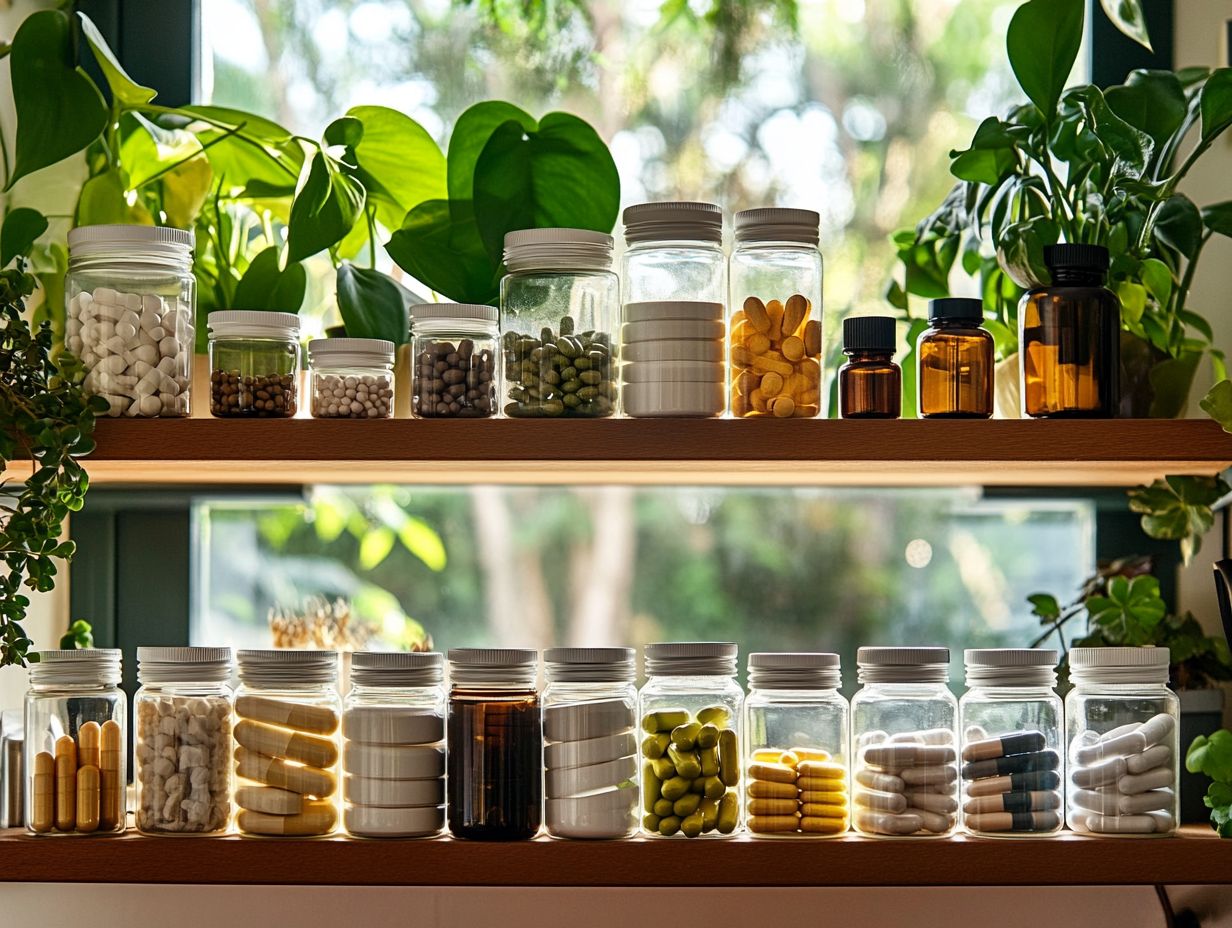
Preventing spoilage and contamination of dietary supplements is vital for safeguarding your health and ensuring the effectiveness of the vitamins and minerals you rely on.
To achieve this, use clean utensils when handling supplements; dirty tools can introduce harmful bacteria. Keeping your products dry and away from moisture can significantly reduce the risk of clumping and loss of quality over time.
Recognizing signs of spoilage such as changes in color, odor, or texture enables you to make informed decisions before consumption. Proper storage practices, including keeping your supplements in a cool, dark place and sealing them tightly, play a crucial role in maintaining their potency and overall quality.
When to Replace Your Supplements
Knowing when to replace your dietary supplements is important for maintaining their effectiveness and ensuring you meet your nutritional needs.
Over time, supplements can lose potency, and it s essential to be aware of the signs of expired or damaged products. Staying vigilant will help you maximize the benefits of your supplementation.
Signs of Expired or Damaged Supplements
Identifying the signs of expired or damaged dietary supplements is crucial for ensuring your safety when consuming them. Have you checked your supplements lately?
Look for specific indicators that will enable you to make informed choices. For instance, if you notice any discoloration in capsules or tablets, it s often a sign that something isn t right; a significant color change can indicate degradation. If you detect any unusual odors like a rancid scent this may signal spoilage.
Additionally, changes in texture, such as a sticky or clumpy appearance, should not be ignored. When examining the supplement facts, pay attention to the recommended usage dates and storage instructions.
Understanding how these elements relate to a product’s shelf life will help you make safer, more informed decisions.
Frequently Asked Questions
How should I store my dietary supplements?
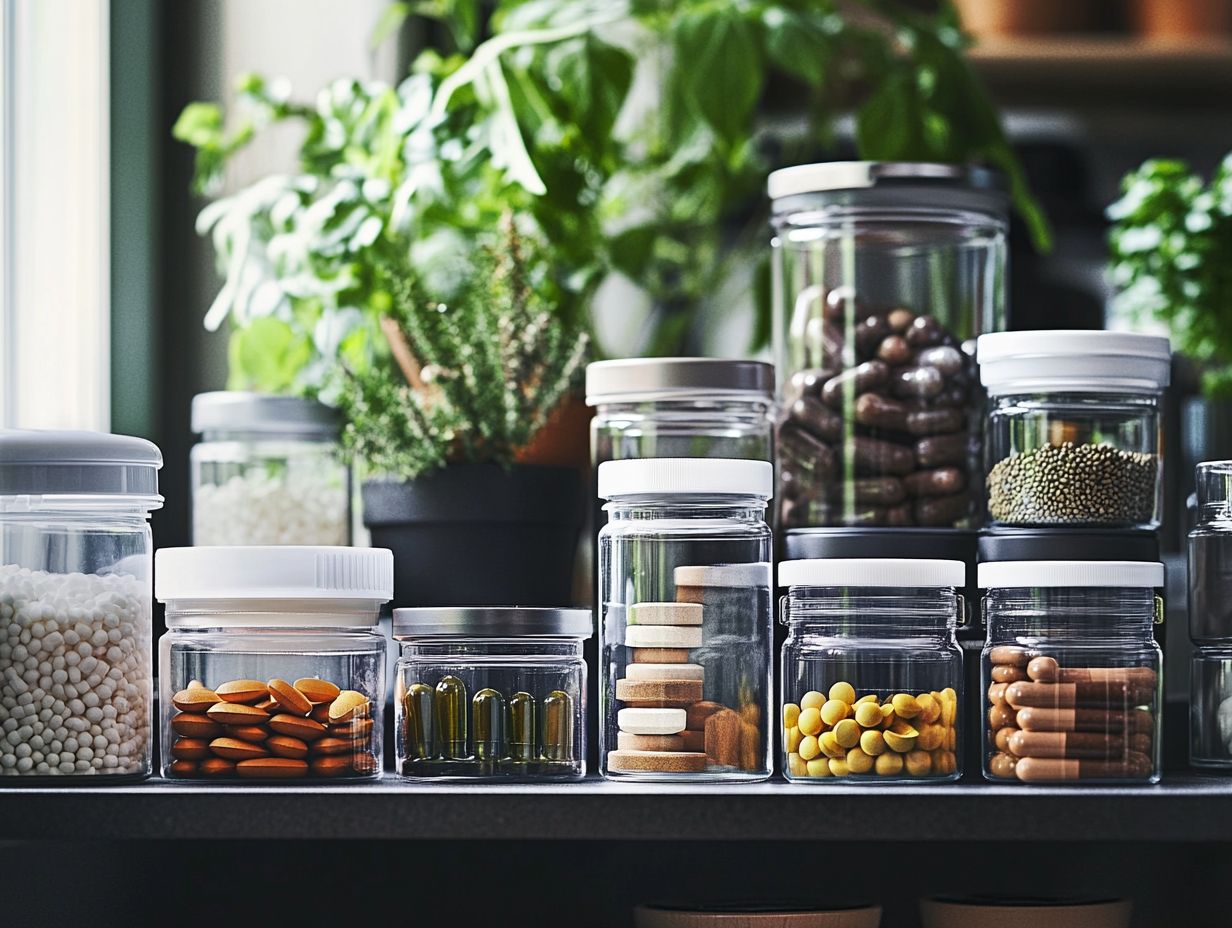
It is important to store your dietary supplements in a cool, dry place away from direct sunlight. This will help maintain the potency and effectiveness of the supplements.
Can I store my supplements in the refrigerator?
Some supplements, like probiotics, need refrigeration to stay effective. Always check the label for specific storage instructions.
Should I keep my supplements in their original packaging?
Yes, keep your supplements in their original packaging. This helps ensure they are labeled correctly and reduces contamination risks.
Can I store my supplements in the bathroom cabinet?
No, the bathroom isn t a good place for supplements. Humidity and temperature changes can affect their quality. Store them in a cool, dry location.
Do I need to keep my supplements out of reach of children?
Absolutely! Always keep supplements out of children’s reach to avoid accidents. A locked cabinet or high shelf is a smart choice.
What is the best way to store liquid supplements?
Store liquid supplements upright in a cool, dark place. Check the label for any special storage guidelines.





